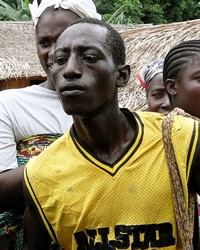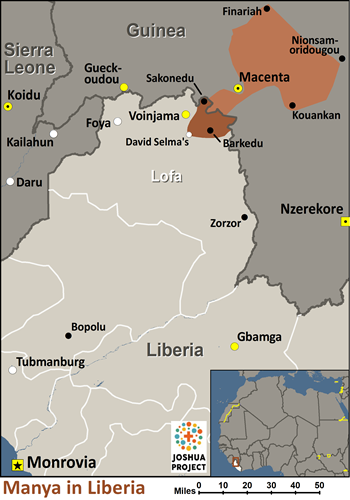The Manya are found primarily in the heavily forested border region of northwest Liberia and southeast Guinea. They are part of the larger Malinke people cluster who trace their history back to the great Malian empire of the Middle Ages. They are descendants of Malinke hunters and blacksmiths from the savannas of present-day Guinea who settled in the forest region alongside the Loma people hundreds of years ago.
The Manya living in rural villages make their living through slash and burn agriculture –growing rice, peanuts, beans, and other vegetables, along with cash crops such as cocoa and coffee. Many men hunt and trap in the forest. Those living in urban areas often work as petty traders or mechanics. Large markets can be found in both rural and urban locations.
A typical Manya meal consists of rice covered with a spicy sauce of greens or vegetables cooked in palm oil with smoked bush-meat or fish. Goats, sheep, chickens and cows are raised in the villages, but these are only eaten on special occasions. Mangoes, pineapples, bananas, oranges, and papayas add balance to their diet.
The Manya generally live in villages of over 500 people, divided into sections according to clans who share a common surname. An elected chief rules villages, but the oldest representative from the descendants of the first settlers is called the "town owner" and also has a position of authority. Clan chiefs and a paramount chief provide leadership on a regional level.
The Manya traditionally live in mud-daubed houses with thatched roofs. Those with the means today build adobe or cement houses with a corrugated tin roof. Polygamy is common, and men often live in compounds with each wife having her own small room or house. Manya society is patriarchal and inheritances are passed down through the males.
Today, the ethnic identity of the Manya is intrinsically tied to their practice of Islam. They hold to a form of folk-Islam that adapts Muslim teachings about the spirit world to the African context. God is viewed as a distant, impersonal master. Between God and man is an unseen world of angels, forest spirits, ancestors and spiritual forces. Holy men called "moli" use Koranic verses and Arabic incantations to manipulate the spirit world and obtain for their clients healing from disease, prevention of misfortune, curses on their enemies, and the assurance of prosperity and success. Many people wear amulets for protection.
Although reform movements in recent decades have led men to abandon the animistic Koma initiation society, women still practice a modified form of the Sande society. Every few years, adolescent girls are secluded in walled-off compounds for a period of several weeks or months, where they undergo cliterodectomy and are taught lessons in morality, life-skills, and medicine. The priestesses who control these societies command great power.
There are few Christian resources available to the Manya in their own language, although a Bible translation project is underway. Audio scripture resources are key, since the language has only recently been reduced to writing. Only a handful of Manya Christian believers have been identified, with no indigenous church yet established. Christians from other ethnic groups tend to view the Manya with suspicion. Fervent prayer is needed to support the mission effort among the Manya.
Ask the Lord to send committed missionaries to share the gospel with the Manya of Liberia.
Pray that God would burden the Christians of neighboring ethnic groups to reach the Manya for Christ.
Pray that the Holy Spirit would touch the hearts of the Manya as they hear the Word of God in the own language for the first time.
Ask the Lord to save key leaders among the Manya who will boldly declare Jesus as Lord.
Ask God to raise up prayer warriors who will faithfully intercede for the Manya.
Pray that strong local churches will be raised up among the Manya.
Scripture Prayers for the Manya in Liberia.
Anonymous.
| Profile Source: Joshua Project |

























